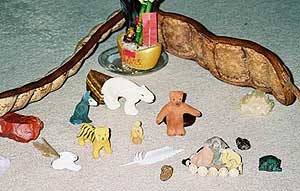A few weeks ago, a friend and I were discussing which films should be considered science fiction and which shouldn’t. He claimed comic book/superhero movies should not be called SF. I claimed that Inception isn’t science fiction either.
While the case can be made that comic book movies can be considered to be science fiction (I agree with my friend, they aren’t), my friend scoffed at my claim that Inception isn’t SF. “How can it not be? People walking around in other people’s dreams seems pretty science fiction to me. They use drugs and some kind of machine. Science!”

Sure, it’s wicked cool, but is it science fiction?
Most viewers would probably agree with him. Inception does seem pretty science fictiony, especially since it is loaded with mind-boggling special effects that bring those dream worlds to life. The premise seems SFnial as well: consciously entering into someone else’s dream state. But this is only smoke and mirrors; a deception that plays into the audience’s expectations. It’s not even all that original an idea.
Setting aside 1984’s Dreamscape (which to my 14-year-old-self was a pretty bitchin’ movie), Inception’s basic premise of entering someone’s dreams with the goal of changing their behaviour is old. Very, very old. Barring the language barrier, the action of Inception would be immediately recognizable to any pre-literate, pre-historic tribal shaman. Inception is, in fact, a shamanic psychodrama.

Giant snake monsters, dream assassins and Dennis Quaid.
What’s not to love?
What exactly is a shamanic psychodrama? Modern psychology defines a psychodrama as “an action method, often used as a psychotherapy, in which clients use spontaneous dramatization, role playing and dramatic self-presentation to investigate and gain insight into their lives”. This type of therapy is typically an externalization of inner mental processes involving “memories of specific happenings in the client’s past, unfinished situations, inner dramas, fantasies, dreams, preparations for future risk-taking situations, or unrehearsed expressions of mental state”. This kind of therapy is a modern interpretation of older, traditional healing ceremonies rituals common among pre-historic and pre-columbian tribal societies.
Not only does the modern description of psychodrama describe the basic plot of Inception, this is more or less a description of what the shaman does. The shaman enters into an altered state of consciousness through a variety of methods (sometimes involving the use of psychotropic plants or chemicals). Within this space the shaman then proceeds to enact any number of designs, including but not limited to, mediation with the spirits of heaven/hell/nature, heal or exorcise wounds psychic or physical, seek out spirits for aid or battle, attack or defend from malevolent entities/shamans/demons, enact change in the physical world, cast spells and modify the behaviour of individuals or groups.
To do so the shaman requires skills such as control over the mental/spiritual/psychic landscape to manipulate perceived reality to his or her advantage. The shaman is often aided by spirits he has control over or is allied with. These beings guide, fight for and abet the shaman in his designs. These spirits often have powers to warp or mould reality, have superlative martial skills, extreme intelligence or expansive knowledge and other abilities that the shaman himself may not posses.
Sounds familiar doesn’t it?
Dom is our shaman; Arthur, Ariadne et al are his spirit allies. Not only does the shaman rescue the spirit of Saito, trapped in the Otherworld, he heals Fischer’s soul as well as casting a spell on him. Dom is clearly a talented and powerful shaman for he, himself, risks becoming trapped in limbo to accomplish these goals, having left his spirit allies behind and venturing deeper into the Otherworld. At every turn he battles the maleficent spirit-being Mal, which takes the form of his dead wife.
If we take the ending of the film to mean that Dom has been in limbo the whole time, then the argument that he is a shaman with his spirit allies is re-enforced. Not only does he accomplish the tasks, but the tasks are themselves the perilous deeds needed to free his soul from the Otherworld.
The science fiction aspects of Inception are limited only to the use of a machine of vague properties and even more vague description. Even the pharmacological chemistry of Yusuf is a modern scientific gloss on the entheogens commonly used in shamanic practice the world over. Even the “totems”, the spinning tops and loaded dice, are representations of the shaman’s objects of power, the talismans of great efficacy with which the shaman can summon spirit allies, divine the future and unseen forces, or use to defend against sorcery and peril.

Might not be spinning tops, but they accomplish
the same tasks.
Inception, then, is only called science fiction because the audience, and the director, need a frame of reference they are familiar with. The world of the pre-historic siberian shaman is as alien to a modern audience as the surface of Mars. Without this familiar frame, the audience would not be able to accept the fantastical action of the film, nor be able to understand the complex and confusing imagery presented to them. The nonsensical action of the film is acceptable to the audience because the audience expects science fiction to be fantastical. In so much as this frame provides this grounding mechanism, one could call Inception science fiction.
This science fiction frame, however, is only window dressing; a facade without substance. As I stated above, if we could somehow show this film to ancient shamans, they would immediately recognize the story, grasp the plot with more firmly than many moderns who have watched it. Can it truly be called science fiction if this is the case? I, for one, would say no. The science fiction aspect are not prominent enough for me to consider it science fiction.
Even if you do not agree that Inception is what I call a shamanic psychodrama, consider the Hellenic myth of Orpheus, or the Sumerian myth of Inanna and Erishkagal. Or Osiris, or Pwyll, or even Christ’s harrowing of Hell. All of these are shamanic psychodramas as well and all of them have more than passing similarities to Inception. This kind of descent to the Underworld/Otherworld is a common myth throughout the world. Inception is just a modern “science fiction” telling of it.

Inanna, a more masculine version
of Leonardo DiCaprio?









